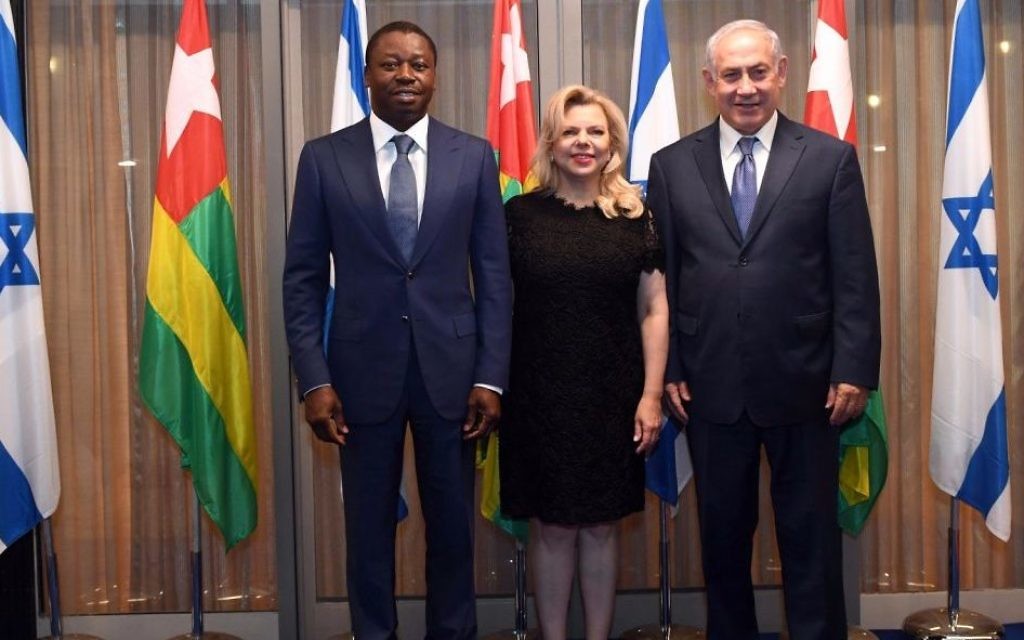Geopolitical Shifts in Africa Open Doors to Israel
Dialogues continue to foster ties between Israel and Africa.

Israel’s relationship with Africa has changed dramatically since the 1960s and 1970s, Eliseo Neuman, the director of the American Jewish Committee Africa Institute, said during a recent Atlanta-area talk on “Israel’s Blossoming Ties With Africa: Why Now?”
AJC recently made its first trip to Africa with lay leaders because of the changes on the continent since the Arab Spring of 2011, which created a geopolitical climate in which Israel is now welcome, Neuman said.

AJC Atlanta Regional Director Dov Wilker introduces Africa Institute Director Eliseo Neuman during a reception for AJC donors who have qualified for membership in the Marshall Society.
“They think of Israel as a startup nation with a First World economy,” Neuman said. “Israel was a poor socialist country in the ’60s, and we looked to Africa as the nearest point beyond our circle of enemies.”
Get The AJT Newsletter by email and never miss our top stories Free Sign Up
Israel wanted to share with Africa the knowledge it had gained through its developmental challenges, such as water availability, nation-building, irrigation and defense, and the Jewish state reached out to many countries under Prime Minister Golda Meir.
Israel sought alliances with African nations that naturally aligned with its sensibilities and plight. Neuman noted that Theodor Herzl was quoted in reference to Africa’s many colonized countries as saying, “Once I have witnessed the redemption of the Jews, my people, I wish also to assist in the redemption of the Africans.”
But that initial phase of knowledge sharing did not end well. Most African nations severed ties with Israel, which the Israelis perceived as a huge betrayal.
The orientation of Israel shifted in the 1970s toward the United States, causing tension with Africa. In the late 1980s and the 1990s, Israeli contact with Africa became sporadic, Neuman said.
“Israel maintained the wrong kind of connections and had a close relationship with the apartheid government in South Africa,” he said. “There was a shift in openness to Africa and dialogue.”
The view of Israel has changed, however, and many African nations now view the startup nation favorably. The strengthening relationships, a diplomatic goal of Prime Minister Benjamin Netanyahu’s government, come at a time when Israel needs friends, especially in the United Nations, and when Israel can leverage its technological growth.
Israel’s expertise on water, energy and public health is valuable to many countries in Africa, Neuman said.
Through Project Interchange, a program that brings leaders from all over the world to Israel, exposing them to the region and its complex issues, the AJC Africa Institute can forge enduring connections. The Africa Institute uses diplomacy to make contacts with businessmen in Africa and connect them with entrepreneurial Israelis.
“Project Interchange fosters strong ties to build a political dialogue and zero in on business leaders, and the results have been fantastic,” Neuman said.
It was a trip to Rwanda that resonated with AJC Atlanta President Melanie Nelkin. She visited the Rwanda-Israel Center of Excellence for Horticultural Development, a joint project between the Israeli Foreign Ministry’s MASHAV international development initiative and the Rwandan Agricultural Board.
Nelkin and AJC met in Rwanda with Boaz Medina, a MASHAV representative who teaches horticulture classes.
“He was teaching them the science of seedlings, germination and techniques specific to the country,” Nelkin said. “Rwanda is not flat. It’s called the Land of a Thousand Hills. You have to navigate the different levels, layers and heights.”
She observed how Israeli technology, including the expertise of solar panel companies, is helping people living in remote villages by giving them access to WiFi, cellphone networks, lights and energy.
She said that forging relationships with African countries couldn’t come at a better time because Israel can help Africa with business and thus help bring people out of poverty.
“If you think geographically where Israel is and where Africa is, you can say they’re neighbors and potential allies, and I think they need each other for that reason,” Nelkin said. “If we can help them elevate themselves economically, then we can ask them to help us raise the profile of Israel on the world stage in the U.N. and the OAU (Organization of African Unity) because Israel is being treated unfairly. It’s about finding common ground and how we go from there.”
But tension remains.
Supporters of the Palestinian cause applied pressure to Faure Gnassingbé, the president of Togo, to cancel an Africa-Israel summit being held in his country. Neuman had planned to attend the summit, and AJC was slated to be featured in a plenary session.
The cancellation has been called a slap in the face to Netanyahu, but not all African countries support an active Israeli presence on the continent.
“In many other countries they don’t identify Israel with a colonizing power,” Neuman said, “but in South Africa they see their identity through a prism of being victims of a racist regime.”
The history of oppression and a large Muslim population put South Africa’s Jews, who are only 70,000 strong and have excelled in every area, at the fringe of identity politics.
Israel’s issues are difficult to advance in South Africa because Jews are seen as white, Neuman said.
“It’s hard for them to see Jews as the victim,” he said. “The heart is with the victim, but the mind is with the victor, and Israel with its own capabilities is under stress.”
Although people in many African countries see no need to take sides in the Israeli-Palestinian conflict, anti-Israel posturing is strong. And while the boycott, divestment and sanctions movement doesn’t have roots in South Africa, history can validate a movement in the eyes of black South Africans, Neuman said.
He said his work shows that Israelis see both sides of the story. “They understand it’s part of a much bigger conversation, and there are Israelis who struggle with that.”




comments